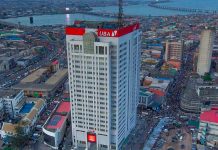The International Monetary Fund (IMF) has forecasted a 3.2% expansion for Nigeria’s economy in 2025, alongside a projected decrease in inflation to 25% for the same year. These insights are part of the IMF’s recently released World Economic Outlook (WEO), which also indicated that global economic growth is expected to remain stable at 3.2% in 2025, unchanged from 2024. However, this represents a slight decline from the Fund’s previous projection in July 2024, which anticipated a more robust global economic outlook.
The IMF’s latest GDP growth projection for Nigeria in 2025 marks a 0.2% increase from earlier forecasts made in July. However, the IMF downgraded its GDP growth estimate for Nigeria in 2024 to 2.9%, reflecting concerns over slower economic activity in the first half of the year.
On inflation, the Washington-based institution projects that Nigeria’s inflation rate will stabilize at 25% in 2025, with a further decline to 14% expected by 2029.
In the broader context of Sub-Saharan Africa, the IMF has estimated a growth rate of 4.2% for the region in 2025, which is also a downgrade from earlier projections made in April 2024. The report attributes this revision to several factors, including climate change-induced weather shocks, supply chain constraints, and the severe economic contraction of 26% in Sudan, exacerbated by ongoing conflicts.
The WEO states, “In sub-Saharan Africa, GDP growth is similarly projected to increase, from an estimated 3.6% in 2023 to 4.2% in 2025, as the adverse impacts of prior weather shocks abate and supply constraints gradually ease.” The regional forecast has been revised downward by 0.2 percentage points for 2024 and upward by 0.1 percentage points for 2025, reflecting the ongoing challenges in Nigeria’s economic performance.
In the first half of 2024, Nigeria’s economy showed resilience despite facing macroeconomic challenges, with GDP growth rates of 2.98% and 3.19% in the first and second quarters, respectively. This performance comes against the backdrop of soaring inflation and a depreciating Naira. The growth rates surpassed those of 2023, demonstrating the economy’s ability to withstand severe shocks, including a spike in petrol prices and an inflation rate reaching a 28-year high.
Notably, Nigeria’s inflation rate only began to ease in July 2024 after 19 months of consecutive increases, starting from January 2023. However, following a brief respite, inflation resumed its upward trajectory in September due to another rise in petrol prices instituted by the Nigerian National Petroleum Company Limited (NNPCL).
The IMF’s projections highlight both the potential for economic recovery in Nigeria and the persistent challenges posed by inflation and external factors. As the government navigates these economic complexities, stakeholders will be keenly observing the effectiveness of policy measures aimed at stabilizing the economy and fostering sustainable growth.










